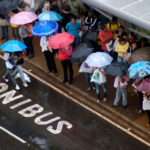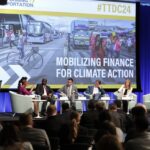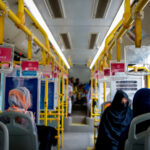Posts tagged with 'bus rapid transit (BRT)'
Mexico became the first nation to declare access to safe mobility a human right in 2020 and two years later passed the General Law of Mobility and Road Safety to protect people, reduce collisions and promote sustainable modes of travel. Now, with this new ...

The adoption of any new technology involves some degree of adaptation, and battery electric buses (e-buses) are no exception. After decades of experience with diesel vehicles, cities and operators need to understand the technical and operational specifications of e-buses to ...

If a picture can tell a whole story, then the image below of an intersection in Dar es Salaam, Tanzania, shows the past, present and future of global transformation in the transport sector. During Transforming Transportation 2024, which focused on ...

In Bogotá, Colombia, over 3,000 people die prematurely each year due to exposure to air pollution—namely from PM2.5, a fine particulate matter produced by vehicle exhaust, burning and industrial outputs. Bogotá is not alone: According to 2021 data, of 174 ...

Public transport is one of the best, most cost-effective solutions available to address today’s climate and development challenges. Buses and trains can reduce greenhouse gas (GHG) emissions by up to two-thirds per passenger, per kilometer compared to private vehicles. The UN’s latest ...

In Asia, 14 countries — accounting for 26% of global transport emissions in 2019 — have made economy-wide net zero commitments. Momentum towards zero-emission transport is growing with countries enhancing ambition and including transport-related targets in their nationally determined contributions (NDCs). However, ...

As cities across Africa experience rapid growth and increased demand for mobility, there is an urgent need to transition towards more sustainable and effective urban transport systems. The urban planning decisions made today will shape cities for decades. However, improvements ...

Achieving transformation in today’s cities requires the active and ongoing participation of many stakeholders, from the public sector, to civil society, private companies and academia. Non-government organizations can play a crucial role due to their commitment to improving the quality ...

Today’s city leaders face a level of complexity and rapid pace of change that can be overwhelming. Particularly in developing countries, urbanization is unfolding quickly and often haphazardly. One in three urban residents worldwide lack adequate access to at least ...

There is no question that for the world to successfully slow and mitigate the effects of climate change, cities will need to transform. Currently, urban areas consume 78% of the world’s energy supply and produce over 60% of global greenhouse gas emissions. By ...

Indore is known as India’s cleanest city, having secured the title seven years in a row in Swachh Bharat National Cleanliness Surveys, and it is now determined to clean its air too. On February 15, the “Clean Air, Clean Indore” ...

We now have less than seven years to cut emissions in half in order to keep global warming below 1.5 degrees C, the limit scientists say is necessary for averting some of the most dangerous climate impacts. 2022 saw flooding, drought and severe ...

For decades, the city of Peshawar, in the Khyber Pakhtunkhwa province of northern Pakistan, has been rocked by wars and acts of terrorism that disrupted public safety and made it difficult to plan the city’s growth. A particularly challenging consequence ...

Electric buses are key to decarbonizing cities. Compared to internal combustion engine buses and cars, they improve air quality, reduce greenhouse gas emissions, are cheaper to operate and are more reliable in many cases. But the transition to electric buses ...

There’s never been a better time to reduce reliance on fossil fuels. Oil and gas prices are skyrocketing as a result of Russia’s invasion of Ukraine, with gas prices exceeding $4 a gallon in the United States in March 2022 ...

Page 1 of 22123...1020...Last »






















